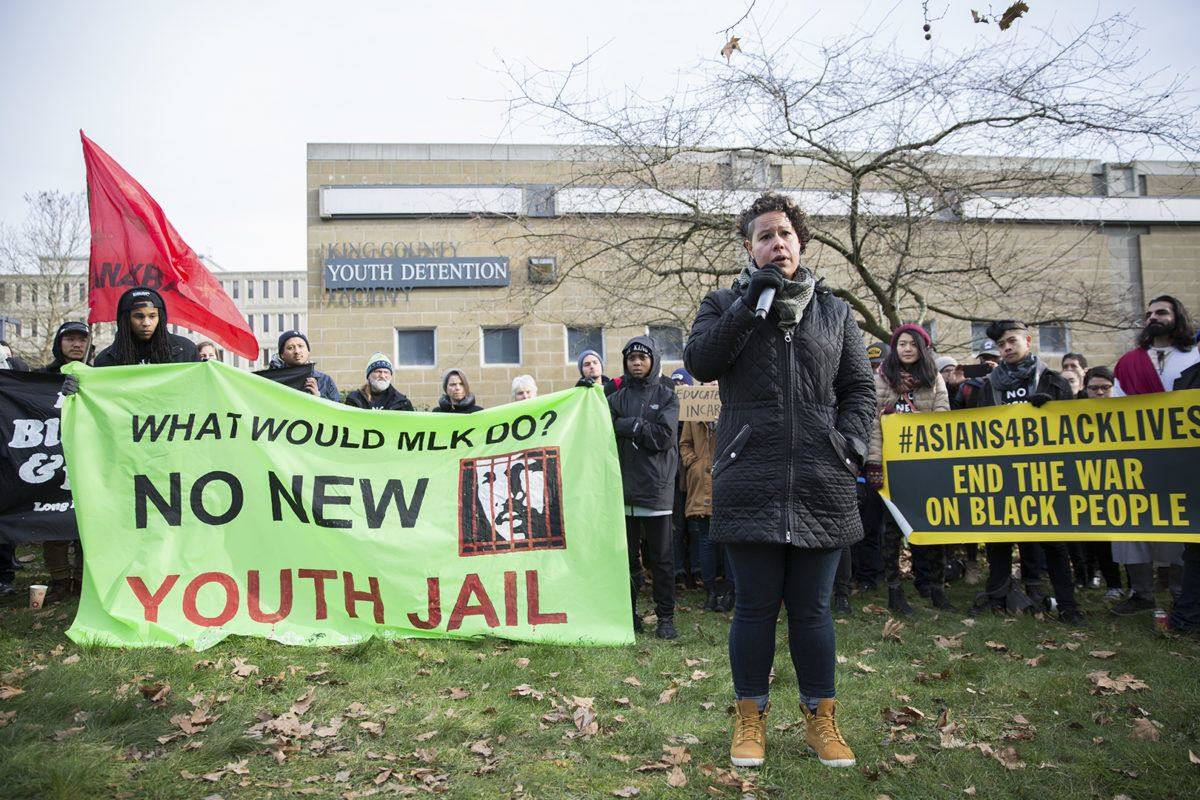A hearing examiner has dismissed an appeal by anti-racist organizers against a building permit that was issued for King County’s planned new Children and Family Justice Center, which includes a youth jail. This despite encouragment from officials for organizers to file such appeals.
EPIC (Ending the Prison Industrial Complex) and other groups have been organizing against the planned new CFJC/youth jail for almost as long as it’s been around. Last year, the Seattle Department of Construction and Inspections (SDCI) let slip the city’s last big chance to block the youth jail when it approved a Master Use Permit for the $210-to-$225 million project. Mayor Ed Murray argued at the time that he didn’t have the authority to intervene in an administrative department decision. But more recently, he and King County Councilmember Dow Constantine suggested in public statements that their respective councils put the breaks on the project, as have members of both councils.
During public outcry over the building permit, Murray and others pointed out that opponents could appeal the decision to the office of the Seattle Hearing Examiner, which rules on city administrative matters. As SDCI director Nathan Torgelson wrote in the official notice of approval for the building permit, “Interested parties may appeal these decisions.”
Many interested parties did—more than 60, according to a press release from Columbia Legal Services. As we previously reported, on January 4 EPIC filed an appeal with the Seattle Hearing Examiner’s office,which has the power to overrule SDCI’s decision to permit the project. The appeal characterizes SDCI’s decison to issue the permit as “arbitrary and capricious and not supported by substantial evidence.” It includes a long and varied list of alleged technical inadequacies: inadequate public notice, inadequate project impact analysis, and even inadequate setbacks from the sidewalk.
But on Wednesday, city Hearing Examiner Sue Tanner agreed with arguments made by lawyers for the city and county that her office lacked the jurisdiction to review this particular SDCI permit. Her decision was based on a complex jumble of overlapping city laws and rules on what can and cannot be reviewed by the Hearing Examiner’s office. Basically, Tanner ruled that city laws as written do not give her the authority to approve or reject SDCI’s decision. Her decision was carefully worded to not make any judgements about the validity of the arguments in EPIC’s appeal.
In a press release, Knoll Lowney, one of the lawyers appealing the building permit, is quoted, saying, “This is a clear example of institutional racism. The City permit explicitly told people to appeal to the Hearing Examiner. But as soon as people of color appealed and were poised to win, Seattle and King County argued that the groups lost their appeal rights—likely forever—because they followed the City’s appeal instructions. It’s outrageous.”
Liza Anderson, assistant city attorney, told the Seattle Times that Torgelson’s notice promising a chance to appeal the SDCI decision was “stock language” used by mistake in a very unusual legal situation. The mayor and county executive’s respective offices did not immediately respond to requests from Seattle Weekly for comment.
UPDATE A spokesperson for the city attorney’s office sent us the following statement:
“Whether DCI’s decision to permit the county’s youth detention center was appealable to the City’s Hearing Examiner is based on complex law. If it had been simple, the Examiner would not have needed nearly four pages to resolve it in the decision issued Wednesday. The bottom line is: EPIC can now appeal directly to the Superior Court.
The City Attorney’s Office continues to take a thoughtful approach to defending City actions. For example, we felt it was inappropriate to move to dismiss the EPIC appeal on two other grounds, so we did not join the County’s and developer’s motions to dismiss the Examiner appeal for those reasons.”
cjaywork@seattleweekly.com








